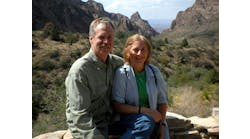Today at ABB Automation & Power World in Houston, Sullenberger described how the moment changed his life and what it has taught him about the importance of leadership, integrity and teamwork.
"For the past six years, I've reminded people that our success was the result of the efforts of many people, including First Officer Jeffrey Skiles and the entire crew," Sullenberger said. "Jeff is not here today but if he were, he would say, 'Hey, I deserve some credit. I was the one who was flying the plane when we hit the birds and made Sully famous.'"
'Pull up, pull up'
After the accident, as they do for every FAA investigation, six investigators met in a room to hear what was on the recorders. They heard every voice, including the pilots, air traffic control and the synthesized voice of the alarm system demanding that the pilot "pull up, pull up—terrain, terrain—too low, too low—flaps—gear—pull up." After the review, one of the investigators said, "That pilot has been training for this his entire life."
In fact, Sullenberger said, his training started before he was even born. "From when my grandparents raised my parents to believe that education is valuable, that ideas are important, and to strive for excellence," he said.
"Flight 1549 was a novel situation for which we did not—could not—train, a water landing. In all my life, my only training for a water landing was one hypothetical classroom discussion." Captain Chelsey "Sully" Sullenberger spoke on the importance of leadership, integrity and teamwork today at ABB Automation & Power World in Houston.
In our 21st century, it's now an economic necessity to learn, to grow, to stretch and to reinvent ourselves—to innovate, which Sullenberger defined as, "to change before you're forced to. I learned this from my parents and through basic training in the Army Reserve, a system designed to change us, to challenge us, to tear us away from the familiar and find strengths we didn't know we had. To learn that it's not about me, it's about us."How often are we called upon to demonstrate duty, capacity, integrity and courage, as if lives depended on it? More often than we realize."
Results matter, but also how they're obtained matters. Ego can be a powerful driving force, but "unchecked, it can be your worst enemy," Sullenberger said. "It can wall you off from others, from your team's critical knowledge and abilities."
Failures of culture, leadership
The events that led to BP's Deepwater Horizon oil spill were "more of a leadership and cultural failure than a technical failure. You have to consider the human aspect, from the beginning," Sullenberger said. "You can't outsource core values to a third party."
It's said that safety begins in the boardroom, but that presupposes that the board cares and has the knowledge. Leaders must create an atmosphere and reward system where people can perform according to their innate desire to do good work, be safe and excel.
When core values, leadership and teamwork align, you're prepared for the unexpected, and can innovate to meet new situations, solve problems and succeed.
"Flight 1549 was a novel situation for which we did not—could not—train, a water landing," Sullenberger said. "In all my life, my only training for a water landing was one hypothetical classroom discussion."
Events are almost never caused by a single failure—they're the result of a chain of events. "In the military, we train to a great extent on every detail, but on a mission you change and adapt," Sullenberger said. "Like Flight 1549, you may have only seconds or feet to act."
"It's afterward, in debriefing, when we learn. In aviation, it's a formal process that can take a year or more after an incident, with structural analysis, re-creation and reviews of recordings and data. The lessons are bought with blood—we know what we know because people have died."
The human factor in aviation
In the early days of aviation, pilots were arrogant daredevils. "Now, with jets instead of props and simulators to train us, we're studying humans along with the technology, to find the best pilots and understand how to use them to find the best way to train others to be as good," Sullenberger said.
How does a team of experts become an expert team? A large airline may have 10,000 pilots and 50,000 flight attendants. "I met Jeff three days before Flight 1549, but we worked together like we'd known each other for years because of our training," Sullenberger said.
Before every flight, the entire crew has a short meeting. "We meet each other, weigh each other up and have a safety discussion," Sullenberger said. "The captain makes a pact with the crew: you be my eyes and ears, and I'll get you what you need to do your job, from maintenance to catering."
For each flight, the airline does a head count and a ticket count, and the industry standard is that the counts should match, plus or minus two. "Early in my career, I decided that I needed to know how many people were on my plane—the counts had to match exactly," Sullenberger said. "I never thought I would need that information, but that day I did."
108 seconds
Flight 1549 was completely routine for the first 108 seconds. "Then I saw the birds, a flock we couldn't avoid," Sullenberger said. As the birds slammed into the plane and destroyed the engines, the plane experienced a complete loss of thrust. "My pulse went up. I was in shock. I thought, this doesn't happen, not to me," Sullenberger said.
"Then the training kicked in. I forced myself to calm down. I thought about what I knew—my training and experience—modified it and adapted it to the situation. Then I set priorities, focused on the highest priority items and ignored everything else.
"The traffic controller tried to do his job, to get us to a runway, but that wasn't going to be possible. The divert was the hardest part, to look visually and decide we couldn't get there and to land on the river.
"The copilot knew instinctively what to do, to call out altitude and airspeed so I could judge how to put the plane on the water without dropping it or diving in. We told the passengers to brace for impact, because we didn't know how bad it would be. When we came to a stop, we floated. Jeff and I turned to each other and we both said in unison, 'That wasn't as bad as I thought it would be.' But we didn't high-five; we still had to get 150 people off the plane. The last three were the head flight attendant, Jeff and me.
"After the event, some of my coworkers and acquaintances started telling 'Sully stories,' anecdotes about me that they remembered and I did not." Sulllenberger said these stories reinforce his belief that his actions that cold January day were the sum of many conscious choices to do the right thing and to make a positive difference over the years. One Sully story was about a late night flight arrival with an elderly fellow who needed a wheelchair to get off the plane. The wheelchair didn't show up, so I went into the airport, found one, brought it back and wheeled him out. I've always wanted to make sure my passengers got to where they were going.
"And when you get to the end of your life and have to answer the question, 'Did I make a difference?'" Sullenberger said in conclusion, "I hope you can answer, 'Yes.'"




